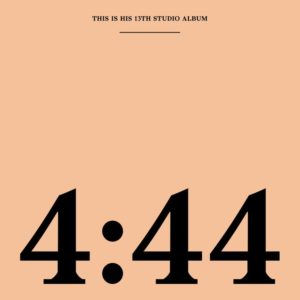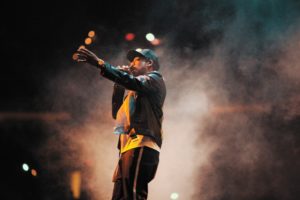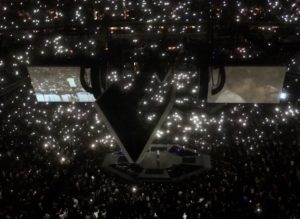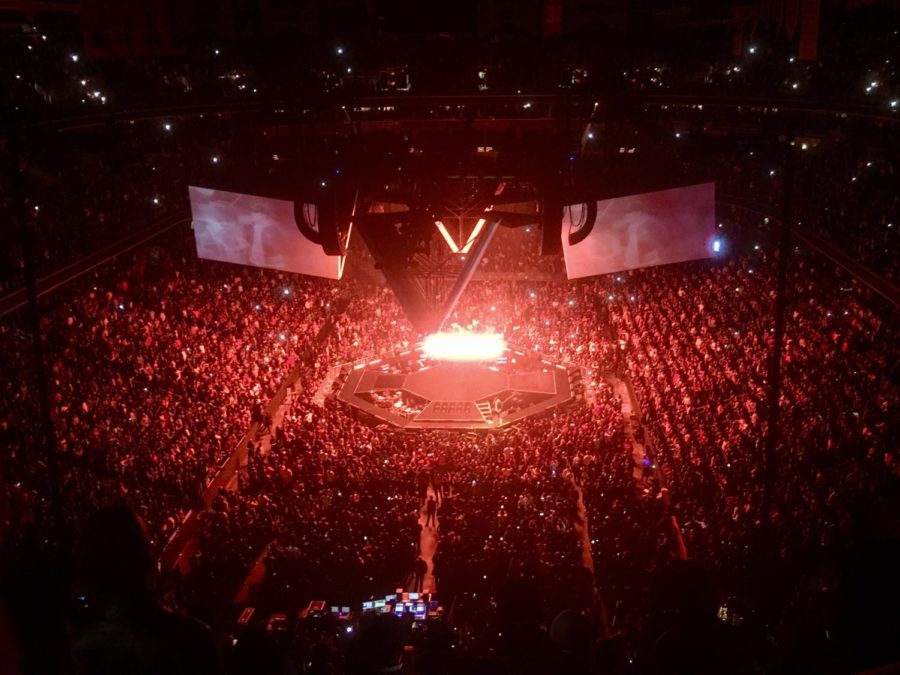Jay-Z Inspires and Delights in Washington
Rapper bares soul, delivers classics at once-in-a-lifetime concert
The lights pulse at Jay-Z’s Washington D.C. concert on November 29th. The rapper played his classic hits as well as newer, more personal tracks.
Jay-Z has always pushed the envelope, but he began his concert in Washington with an absolutely unbelievable statement. Massive screens in the center of Capital One Arena showed his unsmiling, chain-clad upper body. Suddenly, these pictures appeared to burn, fake fire claiming first the rapper’s eyes, and then spreading around his face. Eventually the iconic images were gone and the crowd watched smoke float slowly upward in their place. To begging cries of “Hova” and “Jay” from the crowd, the 48-year old rapper suddenly emerged onto the stage, beginning his D.C. tour stop with an indictment of his former ego in Kill Jay Z. He spun around the stage, rapping “Kill Jay Z, they’ll never love you, you’ll never be enough, let’s just keep it real, Jay Z. F*** Jay Z…”

The track comes from Jay-Z’s newest and 13th album, titled 4:44. The project has been critically acclaimed for its ideas, honesty, and openness, earning Jay-Z eight Grammy nominations. On November 29th, the 4:44 Tour reached our nation’s capital, landing in basketball and hockey stadium Capital One Arena. After the opener Vic Mensa broke in the stage and the crowd’s eardrums, Jay-Z delivered an awe-inspiring performance.
The Brooklyn-born rapper strategically mixed his new releases and early hits, playing fan favorites from across his entire 21-year career. 99 Problems, Big Pimpin’, Run This Town, Izzo (H.O.V.A), N***** In Paris, Can I Live, and Public Service Announcement kept the crowd bouncing and singing along with every single word. At one point, after the crowd roared its approval at Jay-Z’s choice of I Just Wanna Love U (Give It 2 Me), the rapper spun happily in a circle of purple light, bragging “I got like a million of these.”

This is not to say that the show was light on substance. In Allure, Jay-Z discussed the thrill and motivation behind his past of committing crimes. In Smile, from 4:44, he gave voice to his mother’s difficulty coming out as gay, and his joy in her finally finding love. Smile was preceded by an impassioned, moving speech about the importance of finding one’s own happiness. Another 4:44 song, Moonlight, focused on what Jay-Z sees as rap’s problems with repetition and stagnancy. He also took the crowd back to his hometown, Bed-Stuy, Brooklyn. Though now a mega-millionaire, Jay-Z grew up selling crack cocaine on street corners to make much-needed money. He reminisced on his hustling days with the beloved anthems Empire State of Mind and Where I’m From.
However, the two most important songs of the concert were 4:44 and The Story of O.J., respectively nominated for Song and Record of the Year just a day before Jay-Z’s performance. 4:44 is Jay-Z’s confession of his sins, a deeply personal song that many have called a response to his wife Beyoncé’s Lemonade. Allegedly written by the rapper at 4:44 a.m., it contains apology after apology over Hannah Williams’s sad, soul-filled chorus.

Jay-Z raps: “And if my children knew / I don’t even know what I would do. / If they ain’t look at me the same / I would prob’ly die with all the shame. / ‘You did what with who?’ / What good is a ménage à trois when you have a soulmate? / ‘You risked that for Blue?’” Where in 4:44 Jay-Z confronts himself, The Story of O.J. is about the larger black culture around him. A song that drops the n-word 63 times, the record of the year nominee discusses the importance of using legal capitalism to find lasting wealth. The name of the record is cited in the interlude: “O.J. like, ‘I’m not black, I’m O.J.’ …okay.” This gets at another theme of the song, the fact that in America race is often a stronger indicator of a person’s place in society than their actual job or class.
Both Jay-Z and the opener Vic Mensa spoke at length during their shows about race relations and problems with American society. Mensa dedicated We Could Be Free to the unarmed black people killed in the past two years by police officers, and rattled off a list of victims’ names. Jay-Z’s music, especially his new album, is heavy on promotions of equality and raising up the black race. He complemented song lyrics like “What’s better than one millionaire? Two. Especially if they’re from the same hue as you.” with monologues about coming together and using celebrations like the concert to find happiness and growth as a race.

The Brooklyn-born Carter couldn’t have dreamed of this moment, as he affirms with lyrics like “And if somebody woulda told ’em that Hov would sell clothing? Not in this lifetime, wasn’t in my right mind.” Now, however, Jay-Z is cementing his legacy as one of the greatest artists in the history of music. At 48, he’s become a respected and beloved figure inside and outside the industry, even recently speaking on race relations with the New York Times executive editor. He’s become a CEO, an entrepreneur, a mogul, a symbol, and a role model all in one. However, Jay-Z proved in D.C. that he hasn’t lost his touch as a rapper. At the end of the day he’s a happy, nuanced, perfect performer. On the track D’evils from his first album, he rapped “9 to 5 is how you survive, I ain’t tryna survive, I’m tryna live it to the limit and love it a lot.” As he danced around the D.C. stage we could tell that despite how much his life is strained by responsibilities and mistakes, he loves it a lot.



